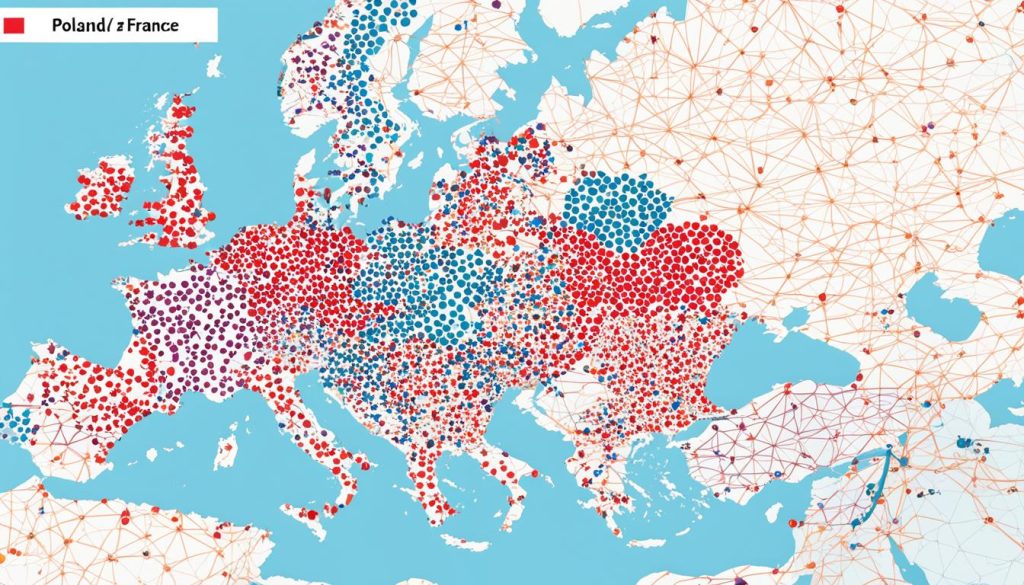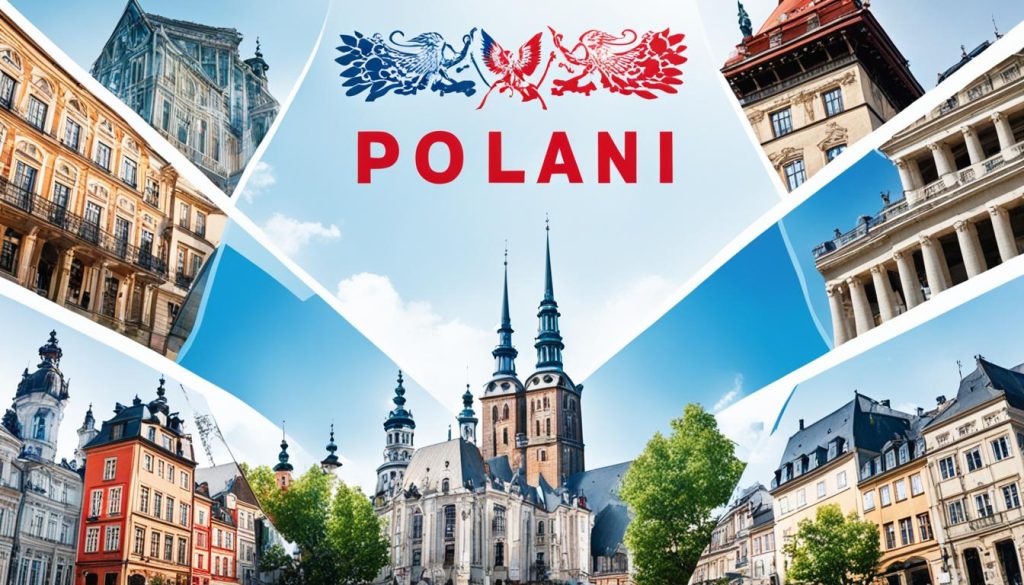In the global business world, understanding each country’s customs is key. Poland, France, and Japan offer different challenges and chances due to their unique cultures. We will look at how these cultural differences impact business strategies.
The importance of hierarchy in France, Japan’s focus on teamwork, and Poland’s changing business scene are crucial. These elements shape how international business is conducted. Understanding them can lead to success.
Understanding Cultural Differences in Global Business
In today’s world, knowing about cultural differences is key in global business. Companies go international and face different cultures. This greatly affects their overseas success. It’s crucial to understand these differences for effective management. This helps in blending business with local ways.
The Role of Culture in Business Endeavours
Cultural nuances are at the core of global business. They set the rules for how businesses worldwide interact. Beliefs and traditions influence negotiation and leadership styles. They affect how employees feel and work. Companies need to respect these differences to support a diverse team. This helps them stay strong internationally.
The Impact of Cultural Norms on International Operations
Some cultures accept power differences more than others. They might also handle uncertainty differently. These aspects of culture create challenges for global businesses. It’s crucial to recognize and adjust to these differences. Doing so helps in planning and leading effectively in other countries. It also prevents mistakes in marketing that can harm a brand’s image. An example is Pepsi’s error in Southeast Asia.
A good global strategy pays attention to cultural details. Understanding cultural differences makes managing across countries smoother. It forms the basis of successful global business. Being informed about cultural diversity turns challenges into growth chances. This helps companies thrive worldwide.
Comparative Analysis of National Culture Dimensions
Global business is deeply influenced by national culture dimensions. The GLOBE project’s research throws light on how these dimensions craft international business. By looking into these dimensions, firms grasp the uniqueness of global markets better. They become more skilled and insightful.
Assessing GLOBE Project’s Cultural Dimensions
The GLOBE project outlines nine key cultural dimensions. These dimensions highlight the varying norms and practices of different nations. Important areas include power distance, future orientation, and assertiveness in business settings. These dimensions guide multinational companies, helping them to adapt to cultural differences.
Power Distance and Business Hierarchy
Power distance shows how societies handle inequality and authority. It greatly affects business structure, guiding corporate leadership and governance. High power distance countries show strict hierarchies. This defines clear roles and relationships in business. Meanwhile, countries with low power distance prefer more equal business interactions. This influences management and what employees expect.
-
Cultures with low power distance opt for flat organisational layouts. They encourage open talks, challenging usual business structures.
-
In contrast, high power distance settings keep to tight hierarchies. Here, bosses make most decisions, giving little freedom to others.
Studying cultural dimensions, like power distance, affects business tactics in new markets. It stresses the need to respect local cultural nuances.
Comparing further, we see countries may be neighbors but have vastly different cultures. This requires a careful approach when expanding businesses internationally.
Business Culture in Poland: Formality and Directness
The business world in Poland is quite formal. This sets it apart from many Western European countries. Poland’s work environment strongly focuses on hierarchical management and set ways of doing things. This approach stems from the country’s rich history.
The Influence of Polish History on Business Practices
Poland’s eventful past, especially after communism, has shaped its business culture. There’s a notable strictness and a strong belief in following rules. Due to this history, people in Poland are very direct during discussions. They say what they think clearly when they talk business or share ideas.
Generational and Regional Variations in the Polish Workplace
There are clear differences in how different groups in Poland work. Older workers and those in smaller towns stick to the traditional Polish business culture. They like formality and clear company structures. On the flip side, younger workers lean towards a more easy-going style. They are often inspired by Western ways, liking more freedom and equal chances at work.
- Senior executives stick to formal business rules strictly.
- Middle management sometimes mixes old and new ways of working.
- Young professionals prefer a more informal and equal approach.
These varied approaches show the unique mix of old and new in Poland’s business culture. It’s a blend of tradition and modern ways.
French Business Etiquette: Emphasis on Hierarchy
Exploring French business culture reveals a mix of formality in France and respect for corporate hierarchy. These are key to understanding their business dealings. This culture is built on professionalism and well-organized structures.
French professionals highly value hierarchy. This shapes their business etiquette and influences decisions and tasks. It shows their preference for reducing risks and planning ahead.
- Meetings are quite formal, showing the importance of position.
- Title and rank heavily influence discussions and presentations.
- Following rules and procedures shows respect and professionalism.
In French business culture, the importance of following the corporate ladder is crucial. It ensures effective work and formal, proper ways to work together. This approach underlines the value of etiquette and respect in business.
- High-level executives usually make the final decisions.
- Proposing new ideas means going through the right channels.
- Success is judged by how well one navigates these structures.
Overall, formality in France goes beyond business. It’s a society-wide respect for rules. This creates a refined and stable business atmosphere.
Japan’s Corporate Culture: Consensus and Harmony
Japanese corporate culture has unique qualities. It prioritises consensus and harmony. At the same time, it’s growing more gender-equal. Knowing how to work in Japan means getting the balance between team spirit and the changing roles of genders in firms.
Understanding Japanese In-Group Collectivism
In Japan, businesses form close communities. This feels more like a family than a mere workplace. It stresses unity and long-term commitment. This creates an environment where teams thrive over individuals.
Companies focus on what’s best for the group, not just a few people. This way of making decisions ensures everyone’s point of view matters. It is basic to maintaining a serene, united workplace culture.
- Decisions come after everyone gets a chance to speak.
- ‘Nemawashi’ shows the value of informal talks before any official decisions.
- Keeping peace, or ‘wa’, is central to fostering a team spirit.
The Role of Gender Egalitarianism in Japanese Firms
Gender equality is slowly changing Japanese workplaces. More women are taking roles at all levels, shaking up old norms. This change is driven by new laws and societal shifts aiming for a more inclusive work environment.
- New rules are helping women advance and challenging old stereotypes.
- Efforts to help workers balance their careers and personal lives are increasing.
- Influential figures in companies support gender equality, pushing for more changes.
Japanese corporate culture is evolving. It keeps its tradition of teamwork while welcoming diversity and equality among genders.
Effects of Uncertainty Avoidance on Business Approaches
Understanding uncertainty avoidance is key in global business. It helps build strong cross-cultural bonds. France and Japan prefer predictability in their companies. This shows their high uncertainty avoidance. Poland’s business scene differs. As it joins the global economy, it starts to welcome uncertainty.
The Pursuit of Structure in France and Japan
French and Japanese firms like well-planned approaches. This stems from their culture’s uncertainty avoidance. Leaders there love rules and structured systems. They aim to avoid risks through these methods. This not only soothes stakeholders but also organises their working space. It’s key to their way of doing business.
Poland’s Changing Attitude Towards Uncertainty
In contrast, Poland is getting comfortable with uncertainty. This shift is exciting. It shows they’re seeking innovation and competitive edge. Polish companies are moving away from stiff methods. They opt for flexible strategies instead. This adaptability is crucial for success today.
In summary, uncertainty avoidance plays a big role in business. France and Japan stick to careful planning. But Poland is becoming more adaptable. This offers an interesting look at how businesses change.
Navigating Assertiveness and Communication Styles
In the global business world, being able to communicate well across cultures is crucial. Understanding assertiveness and different communication styles is key. This is especially true when looking at the directness of Polish business talk versus the subtlety of Japanese conversation manners.
Direct Communication in Polish Business
Polish business values direct feedback. Managers and workers in Poland are open and honest in conversations. Being assertive is not just okay, it’s expected. Being clear about what you mean helps avoid confusion in Polish business dealings.
Japanese Non-Verbal Cues and Indirect Discourse
In Japan, business communication is more about subtle hints and polite hints. It’s crucial to sense the air and get what’s unsaid. This approach keeps harmony and respect in the group. Non-verbal signs are key in expressing thoughts without direct words.
Considering both Polish directness and Japanese indirect methods is vital for international businesses. Adapting how we talk to different cultures can improve deals and relationships. It also builds a setting of mutual respect and understanding in a varied global market.
Analysing Performance Orientation Across Cultures
Grasping the role of performance orientation in business globally is crucial. It shows how much we focus on business innovation and success. By looking at different countries, companies can shape their management to get the most from their teams.
This concept is vital for setting up reward systems. It deeply depends on each culture’s view. Nations valuing performance orientation highly support employee growth. They push everyone to do their best.
Business innovation means more than just new products. It’s about improving processes for better international productivity standards. Understanding work ethic differences is key. It lets corporations create reward systems that fit cultural values well.
In places like Argentina and Russia, they see success differently. Here, team wins are more important than solo victories. But for a business to thrive globally, it must adapt to these views. This helps in building a strong, united company culture worldwide.
Future Orientation: Business Planning Perspectives
Corporate cultures with strategic foresight greatly impact their business planning and long-term investment choices. Looking at French and Polish corporations reveals how each country’s heritage shapes their economic strategies and market activities.
Long-term Planning in French Corporations
In France, businesses focus on the future. They aim for sustainable growth and manage risks wisely. Their plans favour long-term investments for steady and secure growth, rather than quick wins.
These firms have solid strategies including innovative moves and growing internationally while looking after home interests.
Poland’s Focus on Tradition versus Progress
Polish companies mix tradition with progress in their planning. They respect established ways but are keen to adopt new strategies for better performance. Initially not so future-oriented, Polish firms are now more open to change. They see the importance of innovation to compete globally.
- Recognising the impact of cultural heritage on business planning
- Evaluating the approaches to long-term investments across different corporate environments
- Comparing the balance of traditional values and progressive strategies within the context of international business
How France and Poland view the future in business is a lesson for global firms. It shows the need to blend cultural loyalty with adapting to the ever-changing world economy.
The Human and Collective Aspects of Business
In business, being the best often means beating the rest. However, looking at French and Japanese work cultures shows us another way. These cultures teach us about the value of working together and caring for each other’s well-being. Through this perspective, we get a fresh view on what makes a business successful.
Cultivating a Humane Orientation in France
In France, businesses are beginning to pay more attention to their employees’ well-being. They are focusing more on health and emotional care in the workplace. This shift towards compassion is part of a global trend towards more humane work practices.
Institutional and In-Group Collectivism in Japan
Japanese work culture is known for its strong sense of unity and teamwork. It values loyalty, group identity, and making decisions together. These values help the whole team move towards shared goals.
Both French and Japanese workplaces show that caring for people and working as a team are key. This approach offers valuable insights for international companies. It helps them build workplaces where ethics and cultural understanding are at the core.
Gender Egalitarianism in Corporate Environments
In today’s corporate world, fighting for gender quality is becoming more important. This fights against old gender roles in business and pushes for fair chances for everyone. Countries like Sweden are making big steps towards a more equal workplace. Meanwhile, places like Japan are slowly changing old traditions. The drive for more diversity in companies is clear worldwide, making our business culture more welcoming for all.
The way we see gender roles in business has often changed, shaped by what society expects and past events. But now, businesses are changing. They are bringing in people of all genders into important roles. This isn’t just the right thing to do—it sparks new ideas and better mirrors our diverse society, helping make business strategies richer.
- Increasing female representation in leadership roles
- Implementing equal pay for equal work
- Mandating gender diversity quotas in boardrooms
- Providing mentorship programmes to support career progression
Fighting for gender equality is both ethically right and good for business. Companies with a mix of genders do better than those that don’t. This shows the strength of having different views and experiences.
- Evaluation of corporate policies promoting gender equality.
- Analysis of the economic impact of gender-diverse workforces.
- Implementation of inclusive hiring practices.
- Development of equitable promotion and compensation systems.
As companies change, valuing equal chances at work becomes key. This is vital for business success and doing what’s ethically right. From local efforts to top-down policies, the push for equal respect in work continues. It brings us closer to a business world that truly represents the diverse society we live in.
Adapting to Global Business with Cross-Cultural Competence
In today’s fast-changing market, knowing how to handle cross-cultural interactions is key. Businesses wanting to grow internationally need to get good at cross-cultural competence. This skill helps avoid cultural mistakes and builds strong, respectful connections with people worldwide.
Building Intercultural Sensitivity
Intercultural sensitivity is crucial for cross-cultural competence. It’s about understanding and respecting cultural differences and similarities. More than noticing these differences, it’s about changing how we see and adapt to them. Firms that train their staff in intercultural sensitivity help them deal better with global challenges.
The Challenge of Cross-Cultural Branding
Creating a brand that appeals across cultures is tough but essential. It’s about understanding and respecting different cultural views. If done wrong, it can confuse customers or even push them away. So, businesses must be careful to create brands that match cultural values everywhere they operate.
- Analyse cultural values to inform branding strategy.
- Engage with local experts to refine cross-cultural branding initiatives.
- Align brand narratives with the cultural context of each market.
Focus on cultural awareness and being responsive makes brands more successful globally. It helps them fit into various markets and adds value to the business world.
The Role of Tradition and Innovation in Tourism
Cultural tourism combines tradition and modernity to attract tourists. It connects historical interest with the desire for new experiences. Places around the world work hard to blend the old and new. They use things like augmented reality in old towns and digital elements in local festivals.
Tourist spots aim to keep their culture while appealing to modern travellers. They introduce innovative ways to experience culture, like virtual reality archaeological tours. And apps that share local stories help too.
- Keeping the original charm while adding modern touches is key to attracting visitors.
- Adding technology to tradition improves the tourist experience.
- New methods make traditional stories accessible to today’s tourists.
Destinations must keep up with trends to stay competitive. They must mix traditional values with innovation. This approach creates a vibrant cultural tourism scene. It makes sure tourists will want to discover their heritage, now and in the future.
Conclusion
International business is not just about numbers and strategies. It’s about understanding the cultural differences between countries like Poland, France, and Japan. This article highlighted how business etiquette and culture vary across these nations. It showed the importance of adapting to these differences in global management.
For companies to thrive in foreign markets, knowing local customs and ways of communication is key. France values a strict hierarchy, Japan prioritises group decisions, and Poland is embracing openness. Each country’s culture brings challenges and chances for worldwide entrepreneurs.
Understanding cultural nuances is as crucial as making business plans. This knowledge is the backbone for succeeding in international ventures. In a world where countries are more connected, being able to adapt to different cultures is vital. It doesn’t just give you an advantage; it’s necessary for long-lasting success abroad.
FAQ
Q: How do cultural differences impact international business?
Q: What are the key dimensions of national culture according to the GLOBE project?
Q: How does Polish business culture compare to other European countries?
Q: What is distinctive about French business etiquette?
Q: What defines Japan’s corporate culture?
Q: How does uncertainty avoidance influence business operations?
Q: What are the communication styles in Polish and Japanese business cultures?
Q: How do performance orientation differences manifest across cultures?
Q: How does future orientation impact business planning in France and Poland?
Q: What role do humane orientation and collectivism play in businesses?
Q: Why is gender egalitarianism important in corporate environments?
Q: How important is cross-cultural competence in global business?
Q: What is the significance of tradition and innovation in tourism?
Source Links
- https://courses.lumenlearning.com/wm-principlesofmanagement/chapter/dimensions-of-cultural-difference-and-their-effect/
- https://www.linkedin.com/pulse/business-culture-poland-łukasz-lemke
- https://ruj.uj.edu.pl/xmlui/bitstream/handle/item/83571/lubecka_a_cultural_dimension_2011.pdf?sequence=1&isAllowed=y
















